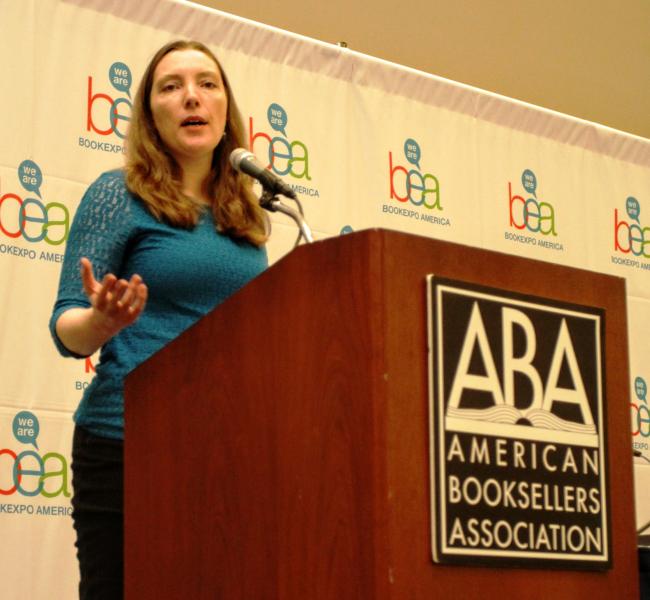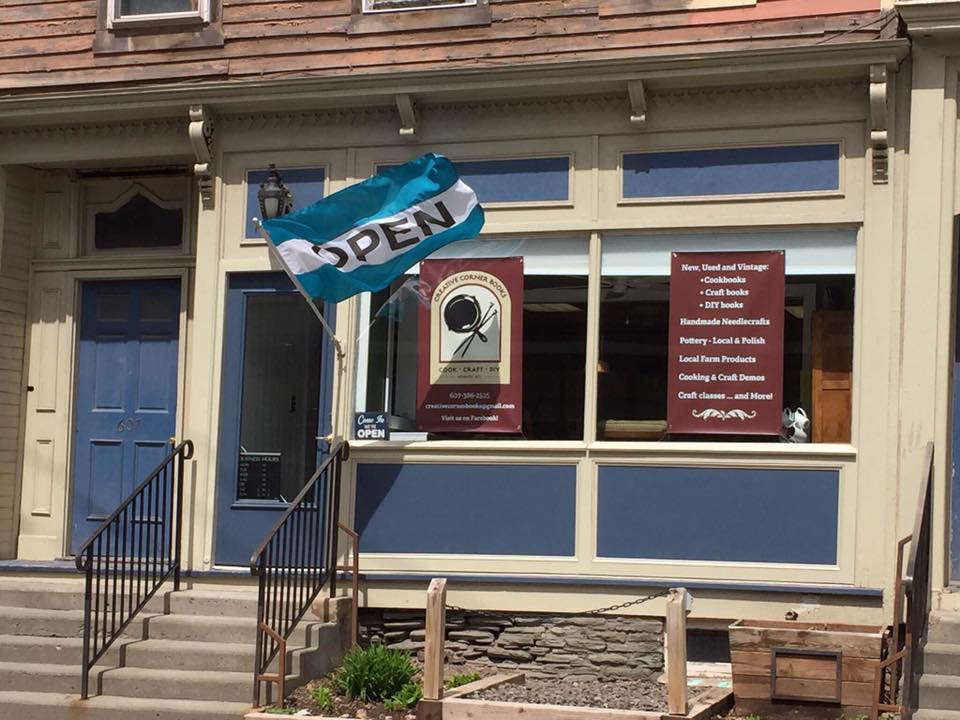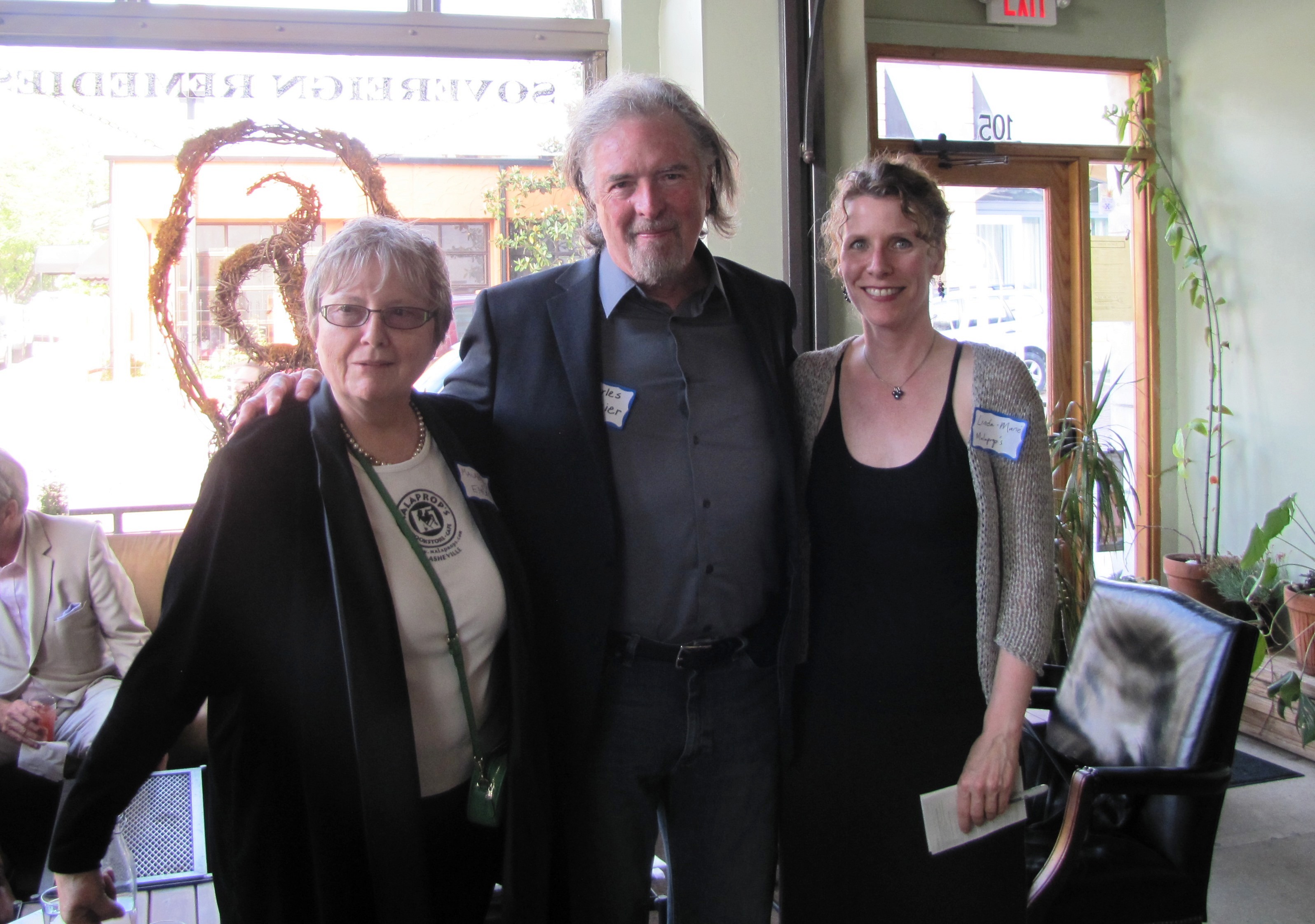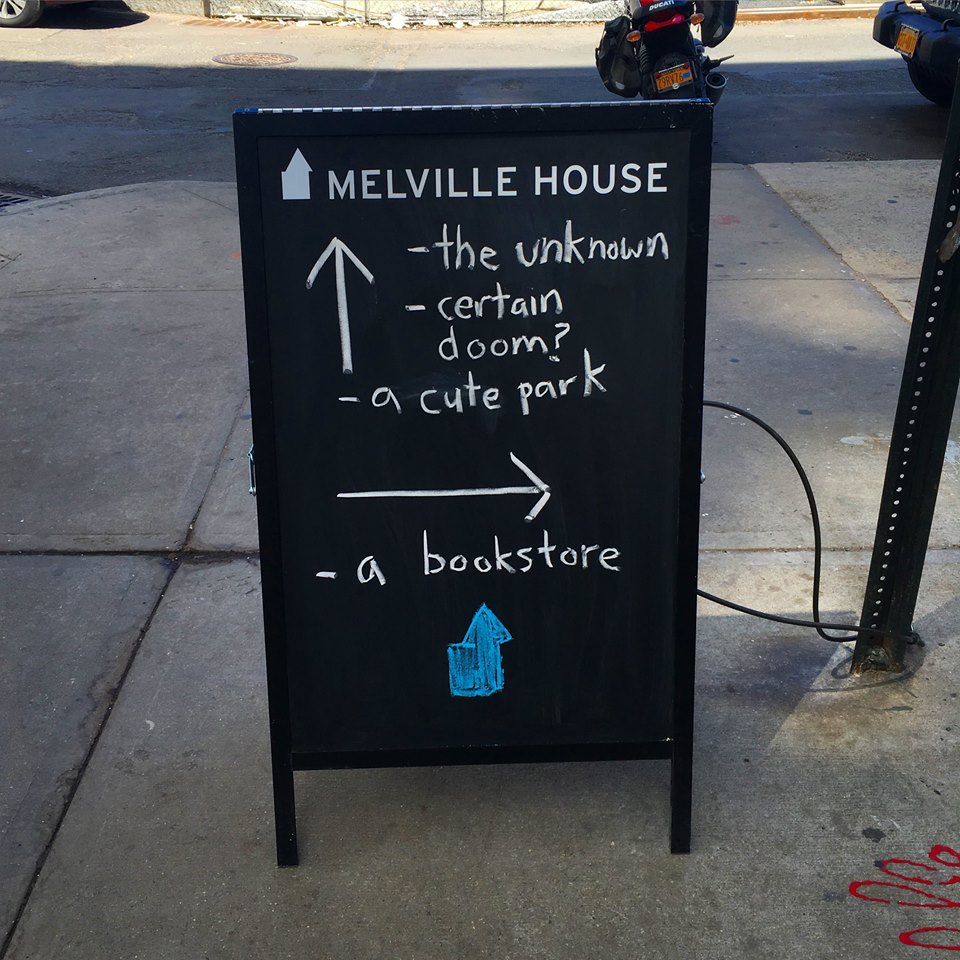 This year's BookExpo America opened with "Meeting the New Localism Challenge: Protecting and Promoting Communities and Local Economies," a plenary talk by Stacy Mitchell, co-director of the Institute for Local Self-Reliance and a leading expert on small business and healthy local economies. After the presentation, booksellers were divided into breakout sessions by region to discuss the issue further.
This year's BookExpo America opened with "Meeting the New Localism Challenge: Protecting and Promoting Communities and Local Economies," a plenary talk by Stacy Mitchell, co-director of the Institute for Local Self-Reliance and a leading expert on small business and healthy local economies. After the presentation, booksellers were divided into breakout sessions by region to discuss the issue further.
American Booksellers Association president Betsy Burton, owner of the King's English Bookshop in Salt Lake City, introduced Mitchell, noting that with her "passion and singleminded devotion" to the cause, "she's the Joan of Arc of Localism.... She's knowledgeable, she's impassioned, she's brilliant."
 |
| Stacy Mitchell (photo: Bookweb.org) |
"Local is really on people's minds in a way it wasn't 10 years ago. People are not only buying locally; they're investing locally," Mitchell said, adding that there are currently more than 150 local first organizations in the U.S., and increasingly "what's wonderful is the neighbors and local businesses actually own their buildings." Noting that "cities are also getting in on this," she cited programs like local purchasing preferred in Cleveland, local business leasing preferences in Seattle, the adaptive reuse program in Phoenix and a formula business restriction in San Francisco.
What has driven the movement? Mitchell mentioned several factors, including campaigns to improve people's knowledge of the Localism trend, some broader cultural movements ("Millennials shopping as a cultural experience."), as well as local businesses just "getting better at what they do."
Having come this far in a decade, Mitchell posed the next logical question: "How do we make Localism central to the conversation about the future of the economy?"
Noting that there is still enormous corporate consolidation going on in many industries, she said this could be "an opportune moment for going to the next level" with Localism. Mitchell suggested a number of options for doing so, including leveraging "this amazing body of scholarship" that has been collected; creating a well-defined localist policy agenda ("This is what we need to do..."); reviving anti-trust policy ("There seems to be this shift that's beginning to happen... I think there's an opening."); eliminating tax breaks and subsidies to large companies; expanding access to credit; making more investment funds available from states and cities; rewriting local zoning codes to favor independent businesses (more walking friendly streets, for example); and maintaining affordable spaces.
"We need to reinvest in a new generation of entrepreneurs," Mitchell said. "We need to cultivate stronger networks and initiatives among elected officials. We need to engage with our customers not just in their role as customers, but as citizens... engage with them as advocates.... We need to do a better job of telling this story."
After Mitchell's speech, booksellers were divided into regional groups for breakout sessions to discuss Localism. One of the facilitators was ABA board member John Evans, co-owner of DIESEL, A Bookstore, with locations in Oakland, Larkspur and Brentwood, Calif. I asked him to share highlights of his session:
"There was obviously much that could be discussed after Stacy Mitchell's talk," he recalled. "Since the breakout sessions were divided geographically, our California group met and immediately diverted from the discussion group structure graciously provided by the ABA. The initial topics and discussion points revolved around the Localism presentation and Amazon studies, with talk of how Amazon leverages their power over the whole ecosystem, for example price devaluation of the book and negotiating radically cheaper freight costs. Attempts to solve those inequalities led to inquiries about whether group rates for freight could/should approach some kind of equity with their rates. Also, more abstract notions such as no prices on books or MSRP pricing of books, common in other industries.
"We also discussed how to increase the awareness of the importance of Localism: the stories of local stores' places in our communities; customer stories; and other local businesses with similar stories. Spreading this news--economic and cultural--to local and state officials, was discussed as another aspect of informative storytelling we all should engage in. Energizing the whole community from customers to other business leaders, elected officials to media, about the relevance and importance of the new Localism and how it has to impact zoning, city contracts and council giveaways Stacy discussed and the economic studies show.
"The conversation then moved from the more general to specific tactics for effectuating change including: marketing to Airbnb, realtors, Yelp, Google, other local businesses; broadcasting the notion of bookstores and other businesses as advocates and good citizens with regard to real life, where we all live, and the things that only can happen in real places like bookstores; working with schools and merchant crawls to tie different aspects of our communities together better. We ended with a discussion of the challenges of financing for new stores and established stores, including the benefits of local credit unions; educating banks; SBA; and reducing credit card fees and reviewing them annually.
"It was a very satisfying breakout with wide-ranging contributions by the dozen or so people attending, organically moving from the more global to the more granular issues, concerns, and actions to be taken. It made me proud to be a bookseller, and also a California bookseller, surrounded by other local, engaged book people. I think it was beneficial in various ways to everyone attending. Plus, we all got to know each other better. Thanks to Pete Mulvihill (Green Apple Books) for co-hosting with me, and Steve Salardino (Skylight Books), who took excellent notes. A fine time was had by all." --Robert Gray, contributing editor (column archives available at Fresh Eyes Now)
 "Growing up as one of seven children, everything was limited or shared. The only exception my parents made was for books. My hometown bookstore--Reader's Books in Sonoma, Calif.--was the one place I was allowed to pick out as many of something as I wanted. I still feel that sense of limitless magic in bookstores and gratitude for the booksellers who are passionate about books and connecting with readers."
"Growing up as one of seven children, everything was limited or shared. The only exception my parents made was for books. My hometown bookstore--Reader's Books in Sonoma, Calif.--was the one place I was allowed to pick out as many of something as I wanted. I still feel that sense of limitless magic in bookstores and gratitude for the booksellers who are passionate about books and connecting with readers."






 The residency, located at the Wellstone Center in the Santa Cruz Mountains, is run by Sarah Ringler and author Steve Kettmann. The residency provides a room and evening meals; the writer can also participate in Wellstone offerings, including weekly yoga and open mic night, and will receive a consultation session with Bookshop Santa Cruz buyers to discuss the market for their project.
The residency, located at the Wellstone Center in the Santa Cruz Mountains, is run by Sarah Ringler and author Steve Kettmann. The residency provides a room and evening meals; the writer can also participate in Wellstone offerings, including weekly yoga and open mic night, and will receive a consultation session with Bookshop Santa Cruz buyers to discuss the market for their project. A grand opening was held recently for
A grand opening was held recently for 
 The
The 
 Melville House Publishing's bookstore in Brooklyn posted some "
Melville House Publishing's bookstore in Brooklyn posted some " The GBO described the book this way: "Romania--the last months of the Ceausescu regime. Adina is a young schoolteacher. Paul is a musician. Clara works in a wire factory. Pavel is Clara's lover. But one of them works for the secret police and is reporting on the rest of the group.
The GBO described the book this way: "Romania--the last months of the Ceausescu regime. Adina is a young schoolteacher. Paul is a musician. Clara works in a wire factory. Pavel is Clara's lover. But one of them works for the secret police and is reporting on the rest of the group.  Julius Zebra: Rumble with the Romans
Julius Zebra: Rumble with the Romans
 Book you've faked reading:
Book you've faked reading: Daniel O'Malley (
Daniel O'Malley (
 This year's BookExpo America opened with "
This year's BookExpo America opened with "